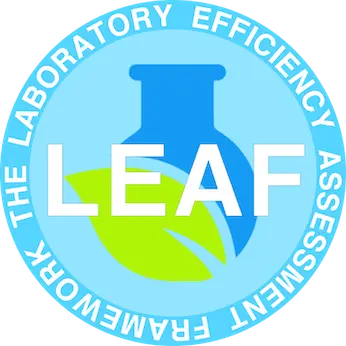Sustainability
The German Cancer Research Center (DKFZ) combines excellent cancer research with a strong commitment to sustainability and climate protection. We promote environmentally friendly practices, sustainable construction, and social responsibility to fulfill our mission for a life without cancer in a responsible way. With ambitious goals, such as achieving climate neutrality by 2035, and an active sustainability group, we drive initiatives in infrastructure, research, and mobility.
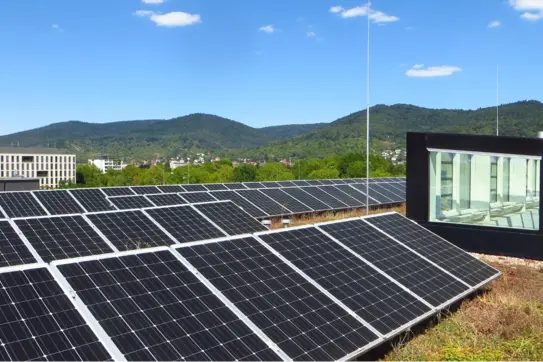
Sustainability Mission Statement
The German Cancer Research Center is committed to conducting groundbreaking cancer research at the highest international level. Our work aims to save lives and improve the wellbeing of those affected by cancer. We strive to provide our employees with an environmentally sound and socially just workplace while practicing outstanding research in a responsible, sustainable, and climate-friendly manner.
Sustainability at the German Cancer Research Center (DKFZ)
The DKFZ recognizes the importance of sustainability and the urgency of climate action in today's world. As the largest biomedical research institute in Germany and a member of the Helmholtz Association of German Research Centers, the DKFZ is committed to excellence in research and to conducting research in a sustainable manner. We believe that groundbreaking research in cancer that saves lives and improves well-being should not at the same time contribute to societal harm and environmental degradation. To conduct research in an environmentally and socially responsible manner, the DKFZ is developing a sustainability strategy in line with science-based targets for greenhouse gas emissions reductions, including goals in the areas of organizational development, research, human resources, construction and infrastructure, procurement, and mobility management. The strategy is based on the guide Sustainability Management in Non-University Research Organizations (German only).
Contact us
Cancer and Climate Change
The links between cancer and climate change are clear. Air pollution, ultraviolet radiation, disruptions in food and water supply, exposure to industrial toxicants, and possibly infectious causes will affect cancer research and control (Hiatt & Beyeler, 2020).
At the DKFZ, we see climate action as our moral responsibility and aligned with our mission for a life without cancer. Therefore, we strive to take actions to mitigate climate change in the execution of our research. The co-benefits that climate action offers are necessary to achieve a world without cancer.
Climate Neutrality
The German government has set the goal to reach climate neutrality by 2045. Considering the special responsibility and exemplary role of science institutions, the Alliance of Science Organisations in Germany, whose members include the Helmholtz Association and thus also the DKFZ, has set the goal to achieve climate neutrality in its working methods and research processes by 2035 at the latest.
DKFZ Sustainability Group
Founded in July 2020, the DKFZ Sustainability Group is an employee-led initiative dedicated to promoting sustainability at the German Cancer Research Center. Through various working groups, members focus on topics such as energy, waste, and nutrition, organizing campaigns and events. In close collaboration with the DKFZ Sustainability Office, they drive and manage numerous sustainability projects, contributing their time and expertise outside of regular work hours.
Activities
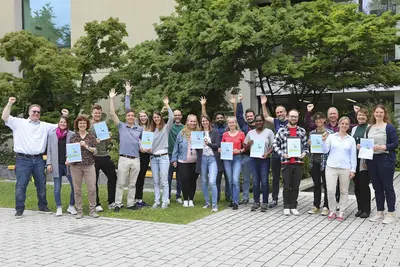
The DKFZ is participating in the LEAF program for laboratory sustainability certification to reduce emissions and enhance sustainability in lab operations. We would like to especially highlight the following laboratories that have achieved certification:
Gold:
Personalized Medical Oncology - A420 (Sonja Loges)
Translational Pediatric Sarcoma Research - B410 (Thomas Grünewald)
Silver:
B-Cell-Immunology - D130 (Hedda Wardemann)
Epigenetics - A130 (Frank Lyko)
Mechanisms Regulating Gene Expression - A350 (Michaela Frye)
Microarray Core Facility - W110 (Melanie Bewerunge-Hudler)
Proteomics Core Facility - W120 (Dominic Helm)
Sample Processing Lab - HD02 (Katrin Pfütze)
Training Lab - M300 (Celina Cziepluch)
Bronze:
Flow Cytometry - W220 (Steffen Schmitt)
HI-TRON (Hafsa Munir / Katharina Wolf)
Immune Regulation in Cancer - D250 (Chong Sun)
Metabolic Crosstalk in Cancer - B350 (Christiane Opitz)
NGS Core Facility - W190 (Stephan Wolf)
Pediatric Immuno-Oncology – D270 (Franziska Blaeschke)
Preventive Oncology - C120 (Petra Schrotz-King)
Signaling and Functional Genomics - B110 (Michael Boutros)
Translational Lymphoma Research - B470 (Katharina Clemm)
Virus-Associated Carcinogenesis - F170 (Ralf Bartenschlager)
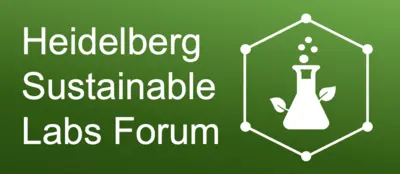
The Heidelberg Sustainable Labs Forum provides laboratory staff from various institutions with the opportunity to exchange ideas and learn from one another on how to make lab work more sustainable. This forum is organized by the European Molecular Biology Laboratory (EMBL), the German Cancer Research Center (DKFZ), the Max Planck School Matter to Life, Heidelberg University, and the Heidelberg University Hospital (UKHD).
The team regularly hosts events and provides a LinkedIn group for discussions on various topics related to lab sustainability, as well as a mailing list for updates.
You are welcome to post your questions or ideas directly in the group or reach out to the administrators for further information.
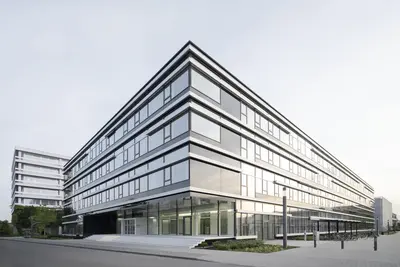
The Construction Department ensures that new buildings constructed under the federal Z-Bau process receive certification according to the Federal Sustainable Building Assessment System. Sustainability aspects are integrated into the planning, and prioritizing renovation, conversion, and maintenance over new construction and acquisitions is a key step in reducing the ecological footprint whenever possible.
Additionally, the use of sustainable technologies, such as heat pumps and photovoltaic systems, is promoted to optimize energy consumption and conserve resources in the long term.
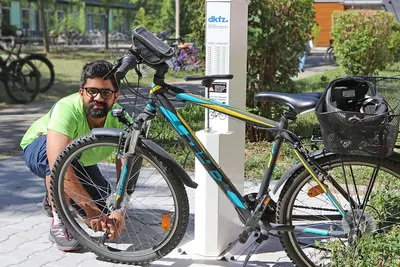
The DKFZ has developed a corporate mobility management concept to reduce emissions from commuting, business travel, and logistics while promoting sustainable mobility. The concept focuses on avoiding unnecessary travel, reducing individual car use with combustion engines, increasing the use of public transportation, and encouraging cycling.
The goal is to increase the share of cyclists from 20% to 27% and the use of public transport and carpooling from 45% to 53% by 2025 while reducing car usage from 35% to 20%.
Measures such as remote work options, a job ticket for public transport, e-bike infrastructure, and initiatives like the City Cycling competition support these goals. Two employee surveys highlighted the high relevance of this topic, and in 2024, DKFZ was awarded "Bicycle-Friendly Employer" (Silver).
Photos
-
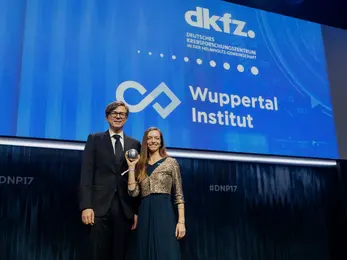
The DKFZ is awarded the 2025 German Sustainability Award in the field of research and development (Dariusz Misztal). -
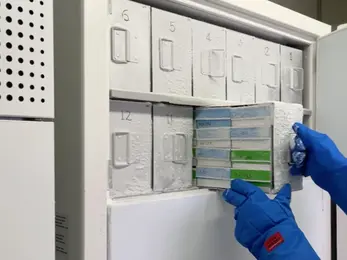
Participating laboratories collectively saved 350 kWh daily during the 2023 Freezer Challenge by implementing best practices in cryogenic storage. -
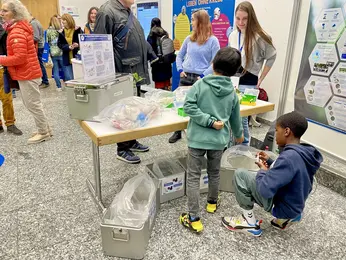
Curious visitors at the 2024 Open House learn at the sustainability booth how to sort different types of plastic in the lab. This is part of a project to recycle polypropylene and polystyrene lab plastics. -
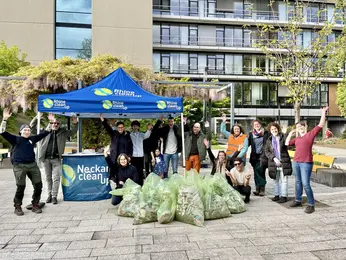
DKFZ and UKHD employees, along with dedicated volunteers, participate in a cleanup event with the Neckar CleanUp association as part of Earth Week 2024. -
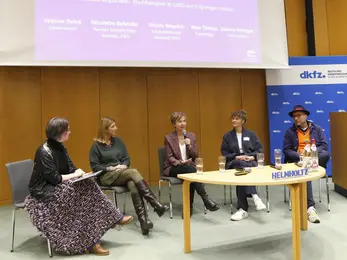
On November 26 and 27, 2024, DKFZ hosted the 5th Helmholtz Sustainability Summit, focusing on environmental, social, and governance aspects of sustainability reporting as well as sustainable research. (Jutta Jung) -

DKFZ volunteers work alongside the City of Heidelberg’s Landscape and Forestry Office to remove the invasive plant Phytolacca americana from the local forest, preparing the area for reforestation. -
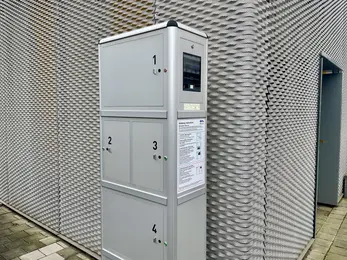
Four charging stations for e-bike batteries are distributed across the Heidelberg campus, allowing e-bike users to charge for free. This initiative promotes eco-friendly mobility and supports the use of sustainable transportation on campus. -
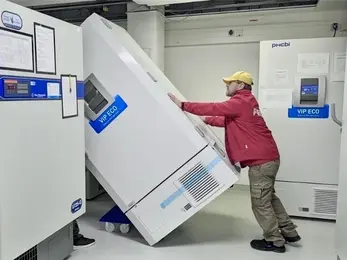
Replacing 54 ULT freezers and 83 conventional freezers with energy-efficient models in 2023 saves 283,035 kWh of electricity annually—equivalent to 100 tons of CO₂. -

Employees build insect nesting aids during Earth Week 2023. -
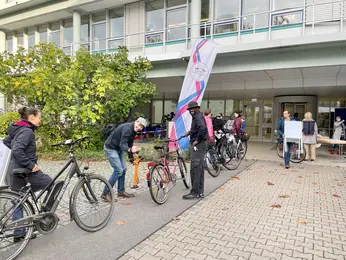
Employees have their bicycles inspected and coded during the annual Bicycle Days. -
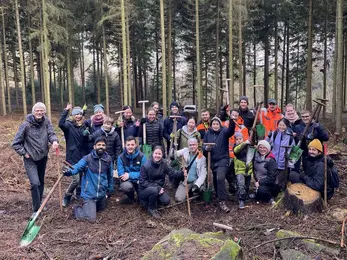
DKFZ volunteers and the City of Heidelberg’s Landscape and Forestry Office celebrate a successful tree planting in the local forest in 2024. -
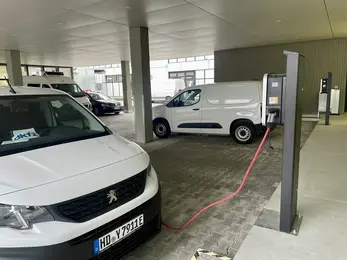
The DKFZ vehicle fleet is transitioning to electric power to reduce CO₂ emissions and improve environmental sustainability.
Sustainability in the Helmholtz Association
Certificates
Our Team
-

Hollyn Hartlep
Sustainability Coordinator
-

Hannah Schröder
Infrastructure and Sustainability Project Manager
-
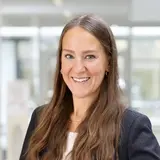
Carolin Winkler
Sustainability Trainee
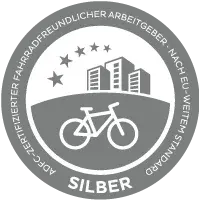

The project "Corporate Mobility Management at DKFZ Heidelberg – Optimization of Bicycle Infrastructure and Promotion of Sustainable Mobility Alternatives" is supported with €196,000 by the Ministry of Transport of Baden-Württemberg as part of the funding program "Corporate and Public Sector Mobility Management" (B²MM).
For more information about the B²MM funding program, please visit the website of the Ministry of Transport.

